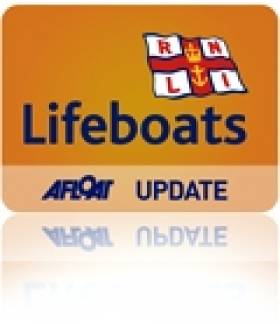Displaying items by tag: Hare
Lough Derg Lifeboat Rescues Three after Yacht Capsizes
At 17.04hrs Saturday September 10, Lough Derg RNLI Lifeboat was requested to launch by Valentia Coast Guard following a report of two persons in the water off Hare Island, on Lough Derg. At 17.15hrs, the lifeboat was launched with Helm Colin knight, Johnny Hoare and Ger Egan on board, and was on scene 17.20hrs. The wind was southwest, force 6, with a 5ft to 6ft swell, visibility was good.
When the RNL lifeboat arrived on scene, a passing yacht was recovering two persons onto their yacht, but had lost a visual on the third person. The lifeboat immediately carried out a search pattern, located the third casualty some four or five hundred metres away, and recovered them to the lifeboat.
Lifeboat Helm Colin Knight said "these three people were very very lucky; the passing yacht only became aware of their plight when, on tacking, one of sailors heard calls for help on the wind and raised the alarm". He continued, "the persons were in the water for at least thirty minutes, in fairly hostile conditions, when the only boat in the vicinity heard their calls for help, someone was looking after them today".
Tasked by Valentia Coast Guard, the Irish Coast Guard Search & Rescue Helicopter team, Rescue 115, took off from their base at Shannon at 17.34hrs. Killaloe Coast Guard had also launched to assist. After establishing that the RNLI lifeboat could be at their station within 5 minutes, Rescue 115 requested the crew to take the casualties to Dromineer from where they5 would transfer the casualties to hospital.
The RNLI lifeboat returned to the yacht, and took a second casualty on board. Killaloe Coast Guard boat took the third person. All were then rushed back to Drominneer where they were met by the helicopter and transferred to Limerick Regional hospital for further treatment.
The lifeboat then returned to 'The Hare' to see if the sunken vessel was a navigational hazard, but there was no sign of wreckage or of the yacht. The lifeboat returned to station and was ready for service again at 18.50hrs.
























































